
The Texas Medical Association House of Delegates on Saturday approved an eight-point plan designed to help reduce resistance to vaccinating children against the cancer-causing human papillomavirus (HPV).
TMA developed the plan in response to Texas’ low rates of HPV vaccination, which has been in use in the United States and other countries for about 12 years.
Although the vaccine has been deemed safe and effective, Texas ranks 47th in its HPV vaccination rate of teens, the recommended age for immunization. Fewer than half of Texas adolescents ages 13 to 17 have received one dose of the multi-dose HPV vaccine.
David Lakey, MD, chair of the TMA Council on Science and Public Health, convened a workgroup early in 2017 to identify obstacles to vaccination and promulgate evidence-based practices for physicians to overcome these obstacles.
After several intensive research sessions and discussions, the HPV workgroup identified eight ways to help reduce resistance to vaccinating children against HPV. The workgroup’s report, which delegates approved over the weekend, include:
- Developing a robust, physician-curated resource center on the TMA website;
- Developing a data workgroup to identify data deficiencies and needed interventions;
- Disseminating best practices to improve HPV immunization rates; and
- Requesting that the Department of State Health Services share HPV county data with the epidemiologists responsible for immunization programs.
Research shows the most important factor in HPV vaccine acceptance is physician recommendation. TMA will work with other interested parties to share that message with busy physicians across the state, as well as tools and tips to successfully convey it.
— Jennifer Perkins
On other public health issues, the House of Delegates last weekend also …
Firearm Debate Gets Heated
The House of Delegates engaged in a long but respectful debate on a resolution recommending that TMA support federal and state bills that raise the minimum age to purchase all guns to 21.
“As a pediatrician, I am committed to public health. Firearm violence is a documented public health issue,” said Ryan Van Ramshorst, MD, a San Antonio pediatrician. “We are not yet half way through 2018, and so far more than 650 children have died due to firearm injury. That is 650 children too many. I feel it is important for our great association to make a statement about violence.”
Although the resolution was filed well before last week’s deadly shooting at a high school in Santa Fe, Texas, the debate came just 24 hours after the rampage that left eight students and two teachers dead.
Sheldon Gross, MD, a pediatric neurologist from San Antonio, was among many who spoke against the resolution.
“I would ask a simple question: Do we have any proof that raising the age to 21 would in any way limit the access to firearms?” Dr. Gross testified. “I think all of us feel the need to do something about this terrible epidemic of gun shootings. I think it needs to be thoughtful and it needs to be something that is effective. I think raising the age to 21 would make us all feel real good about ourselves, but I don’t think it would be effective at all.”
Other delegates argued passionately against the proposal, citing the constitutional right to bear arms and the fact that 18-year-olds who serve in the armed forces carry and use many types of guns and other weapons.
Federal law currently bans the sale of handguns to anyone younger than 21, but regulations on the sale of other types of firearms is left to the states. In Texas, a person who has not been convicted of a felony must be at least 18 to buy a rifle.
After the debate, delegates voted to refer the resolution to the TMA Board of Trustees for further study.
— Sean Price